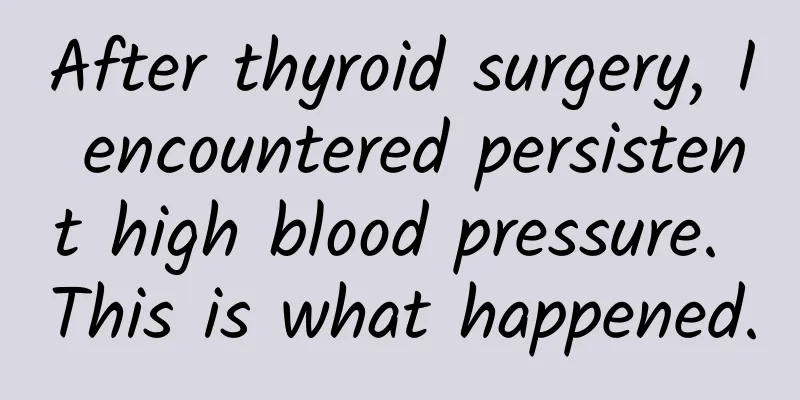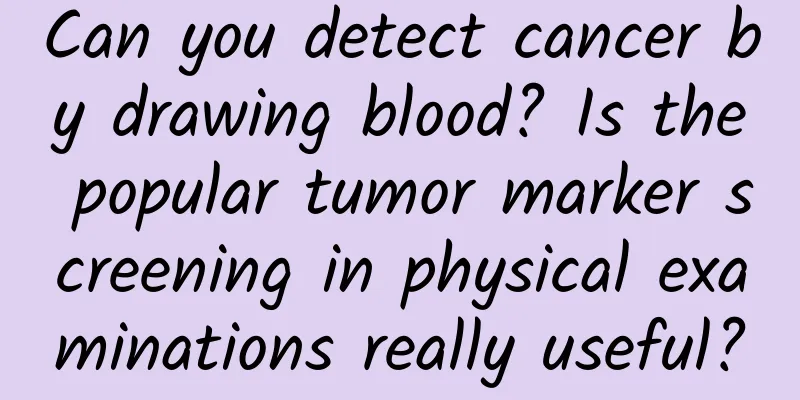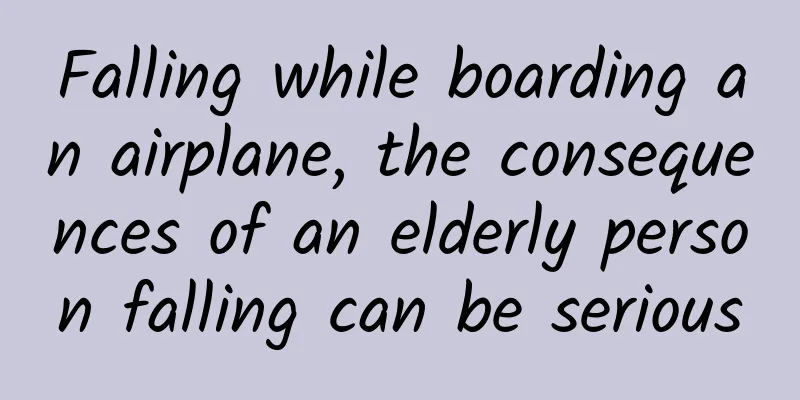After thyroid surgery, I encountered persistent high blood pressure. This is what happened.

|
The night shift in the anesthesiology department made me dread the call from the surgery department. But as I lay down, the surgery department called me. I picked up the phone with a bad mood. It was from the General Surgery Department. Seeing this number made me even more nervous because the General Surgery Department has the largest number of emergency cases. Fortunately, there was no emergency, but a patient from their department who needed our help. Some people may ask: The operation is over, what is the role of the anesthesiology department? Don’t you just give anesthesia? We can't blame everyone, after all, many people don't understand the anesthesiology department. Eliminating surgical pain and creating better surgical conditions are the most basic work of the anesthesiology department. During surgery, the most important job of the anesthesiologist is to ensure the patient's life safety. In addition, the entire perioperative safety is related to the careful handling of the anesthesiology department: before surgery, the anesthesiology department must adjust the patient's vital signs and improve the safety factor of surgical anesthesia; during surgery, escort the whole process; after surgery, analgesia, treatment of complications and accelerated recovery. It can be said that everything from saving lives to dealing with blood pressure is under the jurisdiction of anesthesiologists. Feeling tired, I quickly rushed to the general surgery department. When I arrived at the general surgery department, the surgeon took me directly into their intensive care unit. Since it was time to go to bed, the only sounds were the ticking sound of the monitor and everyone's snoring. The doctor whispered: This patient's blood pressure has always been high. We have tried many ways, but it just won't go down. Can you take a look? At first glance, it was obvious that this was a thyroid surgery. Seeing me looking at her, the patient stared at me with wide eyes, which was obviously not in line with the time when she should have been sleeping and resting. Looking up, I saw that the infusion pump was pumping nitroglycerin hard, and the dosage was obviously very high. Looking back at the surgeon, he had a helpless expression on his face. Looking back at the blood pressure data on the monitor, except for the half an hour after the surgery when the blood pressure was relatively normal, it continued to soar. The several lows were obviously the effect of the antihypertensive drugs. After seeing all this, I had a general idea in my mind. Then, I asked the surgeon to check the surgical aspects again. Because postoperative bleeding and other conditions can also cause pain in patients. Pain and discomfort are one of the main reasons for high blood pressure in patients after surgery. Back in the office, I looked through the patient's medical records. There was nothing special in the records, just a slight high blood pressure. However, one detail caught my attention. I had suspected this when I was in the ICU. The medical records show that she is a teacher. From the way she looked at me, I could guess that she might be a teacher or someone with a high level of knowledge. In addition, she must be a person with a quick temper. Such people cannot understand things as calmly as ordinary people. Perhaps, it may be related to the fact that they know more. The surgeon checked her blood pressure medication again. In addition to nitroglycerin, she also had a stronger blood pressure medication. She even had a tablet of nifedipine under her tongue. At this point, I didn't bother the surgeon. I knew they couldn't handle this situation. So I asked the nurse to bring me some niacin. I could see from the surgeon's eyes that he didn't quite believe it. Because he thought this was a short-acting blood pressure-lowering drug and it was difficult to lower blood pressure to a satisfactory level. At least, in his opinion, even if blood pressure dropped, it would only be temporary. To put it bluntly, he was almost doubting and perfunctory. The nurse brought me the acetaminophen and injected it first, then pumped it in. After a while, my blood pressure came down. After seeing the relatively normal blood pressure value on the monitor, the surgeon breathed a sigh of relief. However, he was still clearly worried. This could be seen from the way he stared at the monitor. While he was half-believing and half-doubting, I told him: Just keep pumping. When the blood pressure is too low, remember to slow it down. Apparently, up until this point, he didn't really believe that his blood pressure could be stabilized, let alone lowered. The next morning, we met again. This time, his eyes changed, no longer suspicious, but full of compliments. He asked me with a smile: "Why is this? We have used this medicine before, but it didn't work." I told him: Treatment is always the simplest. The key is to understand the cause. If you start with the cause, things will become much simpler. Seeing his anxious look, I obviously couldn't keep him in suspense any longer. I told him: The patient's basic problem was thyroid surgery, and he happened to be a very nervous patient, so his blood pressure eventually remained high. He asked doubtfully: Is the basis thyroid surgery? I said: Yes. When you perform surgical operations, squeezing the glands and other operations inevitably squeezes thyroid hormones into the blood. This blood entry generally lasts for at least a few hours. In addition, continued sympathetic hypertonia, that is, she is particularly nervous, will also cause a large amount of sympathetic hormones to enter the blood, which leads to a superimposed increase in blood pressure. He then asked: Can't I use other medicines? I said that if it is not a head and neck surgery or airway surgery, you can first use sedation and then use antihypertensive drugs. The first thing to do to lower blood pressure is to use sedation. But if it is a surgery that may cause respiratory depression or asphyxiation, sedatives should be used with caution. The significance of using niacinamide is that it is a centrally acting antihypertensive drug, especially suitable for tension-type high blood pressure. In addition, it will not cause sedation-related airway events. After hearing this, he finally understood. He gave me a thumbs up and said: Great, great! Your anesthesiology department is still great! |
<<: Common infectious diseases in children and their prevention methods
>>: When is the best time to eat whole grains? The nutritional value of whole grains
Recommend
Is it easy to cure kidney deficiency in women?
Female friends usually have some physical conditi...
Does otitis media affect pregnancy?
Pregnant women are always worried about various d...
What are the disadvantages of overwork for pregnant women?
What are the disadvantages of overwork for pregna...
How to treat fallopian tube adhesions with minimally invasive treatment
Today's medical technology is very advanced, ...
4 tips for long-lasting menstruation
Intermittent menstruation is particularly trouble...
Can I eat nine-segment shrimp during menstruation?
Menstruation is a special period for women so the...
Can kidney disease be inherited? A must-read for those with kidney disease in their family!
In many people's minds, kidney disease seems ...
Can using a breast pump cause mastitis?
A breast pump is an instrument developed specific...
Can pregnant women eat peppercorns?
Pregnant women need to pay special attention to t...
After a child vomits, his stomach is empty. Is it right to replenish water and food immediately?
At the beginning of the Year of the Snake, there ...
Perineum pictures
Women are most worried about having gynecological...
What is the cause of the pimples on the inside of the vulva?
Doctor's reminder: Generally speaking, small ...
What to do if you have chest pain and excessive vaginal discharge
Maybe many of our female friends have recently ex...
Woman sleeping with back pain in the middle of the night
Now I feel that I often have a backache, especial...









